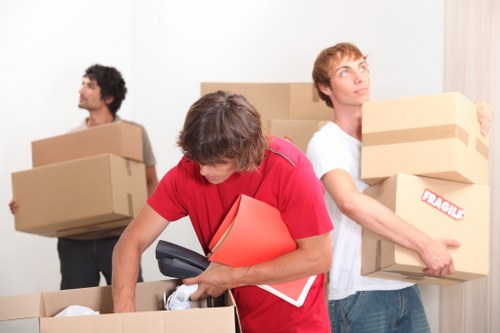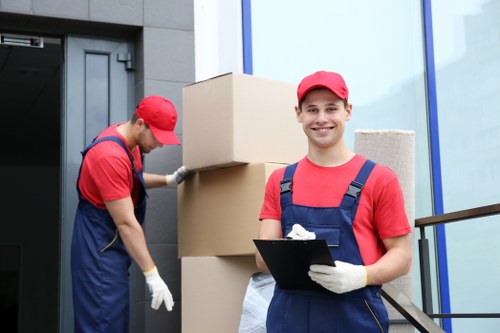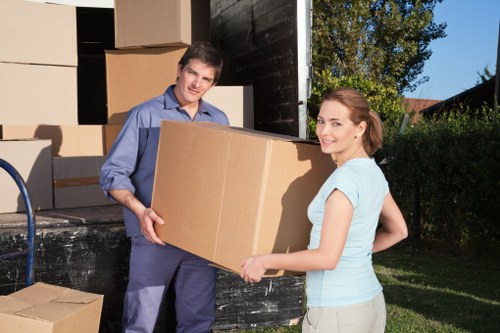Waste Disposal in Waltham Forest: A Comprehensive Guide

Waste disposal is a crucial service that ensures our communities remain clean, healthy, and sustainable. In Waltham Forest, effective waste management is essential for maintaining the area's beauty and environmental health. This guide provides an in-depth look at waste disposal options, services, and best practices in Waltham Forest.
Understanding how to manage your waste properly not only helps the environment but also contributes to the well-being of all residents. Whether you're a homeowner, business owner, or just a concerned citizen, knowing the ins and outs of waste disposal in Waltham Forest can make a significant difference.
From regular household waste collection to recycling services and bulky waste removal, Waltham Forest offers a variety of solutions to meet the diverse needs of its residents. This article explores these services in detail, providing you with the information you need to dispose of waste responsibly.
Importance of Effective Waste Disposal

Effective waste disposal is more than just getting rid of unwanted items; it's about managing resources responsibly to protect our environment. Proper waste management helps reduce pollution, conserve natural resources, and prevent the spread of diseases.
In Waltham Forest, the community is committed to maintaining a clean and sustainable environment. By adhering to proper waste disposal practices, residents contribute to the overall health and aesthetics of the area.
Moreover, effective waste disposal systems help in minimizing landfill use, promoting recycling and reuse, and lowering the carbon footprint of the community. These efforts are vital in combating climate change and ensuring a healthy planet for future generations.
Waste Disposal Services in Waltham Forest

Household Waste Collection
Waltham Forest provides regular household waste collection services, ensuring that everyday waste is efficiently managed. Residents are provided with bins for general waste and recyclables, which are collected on a scheduled basis.
- General Waste: This includes non-recyclable items such as food scraps, non-recyclable plastics, and other household refuse.
- Recyclables: Materials like paper, cardboard, glass, and certain plastics are collected separately to promote recycling.
- Green Waste: Garden waste such as leaves, grass clippings, and branches are also collected to be composted or processed appropriately.
Recycling Services
Recycling is a key component of Waltham Forest's waste management strategy. The council provides facilities and guidelines to help residents recycle effectively.
- Paper and Cardboard: These materials are collected separately and sent to recycling centers.
- Glass Recycling: Clean glass bottles and jars can be recycled to reduce landfill waste.
- Plastic Recycling: Specific types of plastics are accepted to be processed and reused.
Bulky Waste Removal
For larger items that don't fit in regular bins, Waltham Forest offers bulky waste collection services. This includes furniture, appliances, and other sizeable household items.
Residents can schedule bulky waste pickups through the council's website or by contacting the waste disposal service directly. Proper scheduling ensures that bulky items are collected efficiently without causing disruptions.
How to Properly Dispose of Waste

Segregation of Waste
One of the most important steps in effective waste disposal is segregating waste correctly. This means separating recyclable materials from general waste to ensure they are processed appropriately.
- Sort Your Waste: Separate items into categories such as recyclables, general waste, and green waste.
- Use the Right Bins: Utilize the provided bins for each type of waste to prevent contamination.
- Clean Recyclables: Rinse containers to remove any food residue before recycling.
Hazardous Waste Disposal
Hazardous waste requires special handling due to its potential harm to health and the environment. Waltham Forest provides designated drop-off points for hazardous materials.
- Chemicals: Items like paints, solvents, and cleaning agents should be disposed of at hazardous waste facilities.
- Electronic Waste: Old electronics should be taken to e-waste recycling centers to prevent toxic materials from entering landfills.
- Batteries: Single-use and rechargeable batteries must be recycled properly to avoid environmental contamination.
Improper disposal of hazardous waste can lead to soil and water pollution, posing risks to both the environment and public health. Therefore, always follow the guidelines provided by Waltham Forest for hazardous waste disposal.
Benefits of Recycling in Waltham Forest

Recycling offers numerous benefits that contribute to the sustainability and well-being of Waltham Forest. By recycling, residents help conserve natural resources, reduce the need for raw materials, and minimize the environmental impact of waste.
Environmental Impact
Recycling reduces the amount of waste sent to landfills and incinerators, which helps lower greenhouse gas emissions. It also conserves energy and natural resources, as recycled materials require less processing compared to new materials.
Economic Advantages
Recycling can stimulate the local economy by creating jobs in collection, processing, and manufacturing industries. It also reduces the costs associated with waste management and disposal, benefiting both residents and the council.
Additionally, recycling initiatives can lead to the development of sustainable products and technologies, fostering innovation and economic growth in Waltham Forest.
Local Initiatives and Programs

Waltham Forest is home to various initiatives and programs aimed at improving waste disposal and promoting sustainability. These programs encourage residents to engage in eco-friendly practices and provide resources to make waste management easier.
- Community Recycling Programs: Local groups organize recycling drives and educational workshops to raise awareness about the importance of recycling.
- Composting Initiatives: Programs that promote composting help reduce organic waste and create valuable compost for gardens and public spaces.
- Waste Reduction Campaigns: Campaigns focus on reducing waste through initiatives like reusable bags, water bottles, and promoting minimal packaging.
These initiatives not only enhance waste disposal systems but also foster a sense of community and shared responsibility among residents.
Nearby Areas to Waltham Forest for Waste Disposal
- Leyton: Located just west of Waltham Forest, Leyton offers comprehensive waste collection services and recycling centers.
- Leytonstone: North-east of Waltham Forest, Leytonstone has specialized facilities for hazardous waste disposal.
- Walthamstow: Adjacent to Waltham Forest, Walthamstow provides extensive recycling programs and bulk waste removal services.
- Chingford: Southeast of Waltham Forest, Chingford boasts multiple community recycling events throughout the year.
- Snaresbrook: Nearby Snaresbrook offers convenient drop-off points for electronic and hazardous waste.
- Highams Park: Highams Park features eco-friendly waste disposal options and composting facilities.
- South Woodford: Located close by, South Woodford has efficient household waste collection and recycling services.
- Edmonton: Edmonton provides specialized services for bulky waste and large-scale recycling initiatives.
- Clapton: Clapton is known for its community-driven waste reduction and recycling programs.
- East Finchley: East Finchley offers robust waste management solutions, including hazardous waste disposal facilities.
- Tottenham: Situated near Waltham Forest, Tottenham has accessible waste disposal centers and recycling points.
- Bush Hill Park: Bush Hill Park features reliable waste collection schedules and comprehensive recycling services.
- Wanstead: Wanstead provides government-supported recycling initiatives and bulk waste removal options.
- Mayesbrook: Mayesbrook is equipped with state-of-the-art waste processing facilities and community recycling events.
- Hainault: Hainault offers seamless integration with Waltham Forest's waste disposal systems, ensuring efficient service delivery.
Tips for Reducing Waste
Reducing waste is a proactive way to contribute to environmental sustainability. Here are some tips to help you minimize waste in your daily life:
- Buy Reusable: Opt for reusable bags, bottles, and containers instead of single-use plastics.
- Plan Your Meals: Meal planning can help reduce food waste by ensuring you buy only what you need.
- Repair and Reuse: Instead of discarding broken items, try repairing or repurposing them.
- Compost Organic Waste: Composting kitchen scraps and garden waste creates valuable soil for gardening.
- Choose Minimal Packaging: Select products with minimal or recyclable packaging to reduce waste.
Implementing these practices not only helps the environment but also promotes a more sustainable and cost-effective lifestyle.
Frequently Asked Questions
1. How can I schedule a bulky waste pickup in Waltham Forest?
You can schedule a bulky waste pickup by visiting the Waltham Forest Council website or contacting the waste disposal service directly via phone or email. Make sure to specify the size and type of items you need to dispose of.
2. What items are considered hazardous waste?
Hazardous waste includes chemicals, paints, solvents, batteries, electronic waste, and any materials that can pose a risk to health or the environment. It’s important to dispose of these items at designated hazardous waste facilities.
3. Are there any recycling incentives in Waltham Forest?
Yes, Waltham Forest offers various incentives such as recycling rewards programs, community grants for recycling initiatives, and educational workshops to encourage residents to participate in recycling efforts.
4. What should I do with electronic waste?
Electronic waste should be taken to designated e-waste recycling centers in Waltham Forest. These centers ensure that electronics are processed safely and that harmful materials are properly disposed of.
5. How can I reduce my household waste?
You can reduce household waste by following tips such as using reusable items, composting organic waste, repairing items instead of discarding them, and being mindful of your purchasing habits to avoid excessive packaging.